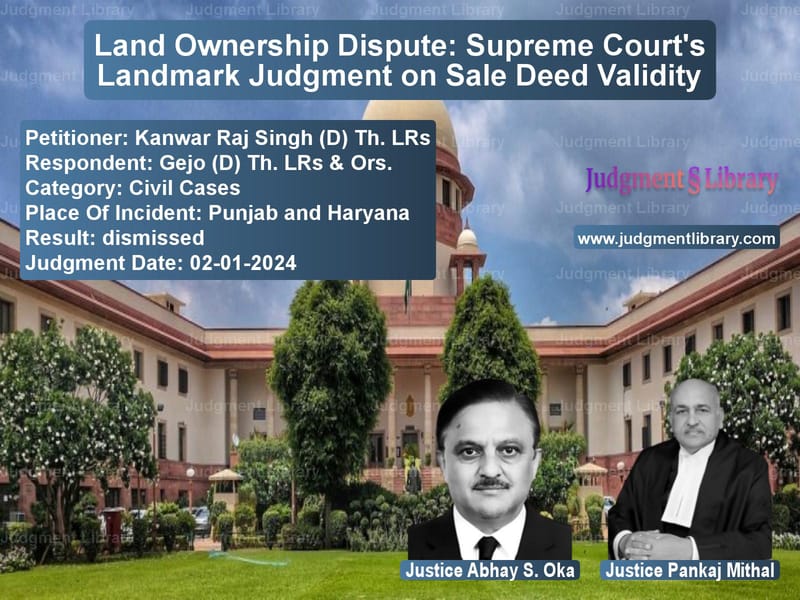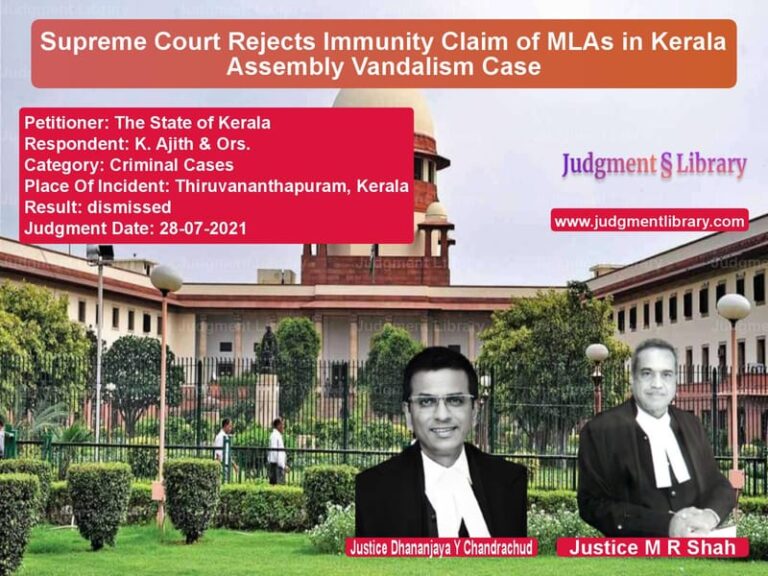Land Ownership Dispute: Supreme Court’s Landmark Judgment on Sale Deed Validity
The case of Kanwar Raj Singh (D) Th. LRs. vs. Gejo (D) Th. LRs & Ors. is a significant legal battle concerning the validity of a sale deed and the rights of property ownership. The Supreme Court’s ruling in this case has profound implications on how alterations in legal documents are interpreted and their legal standing in property transactions.
The dispute arose when the plaintiff, Smt. Gejo, claimed ownership of a 71 kanals 8 marlas property based on a sale deed executed on June 6, 1975, and registered on July 23, 1975. However, the defendant, Kanwar Raj Singh, later altered the document, asserting that only 1/3rd of the land was sold. This change in the sale deed became the central point of contention, leading to a prolonged legal battle.
Background of the Case
The case began when Smt. Gejo filed a suit for declaration, seeking ownership rights over the entire property based on the sale deed executed in 1975. According to her, the defendant, Kanwar Raj Singh, had fraudulently altered the sale deed before its registration, reducing the sold land to 1/3rd of the original area. She argued that the original sale deed, as executed, transferred the entire property to her and that the later modification was unlawful.
On the other hand, the defendant contended that the sale deed rightfully reflected the sale of only 1/3rd of the land. He maintained that the change in the deed before its registration was a legitimate correction rather than fraudulent interference.
Legal Proceedings and Court Judgments
Trial Court Verdict
The Trial Court ruled in favor of the plaintiff, concluding that the original sale deed was valid and conveyed ownership of the entire 71 kanals 8 marlas to the plaintiff. The court found that the defendant’s unilateral alteration was unauthorized and could not be legally upheld.
District Court’s Reversal
The first defendant appealed to the District Court, which overturned the Trial Court’s ruling. The District Court accepted the defendant’s contention that the correction in the sale deed was made in good faith before its registration and was not a fraudulent act. This decision was a major setback for the plaintiff.
High Court’s Intervention
The plaintiff, through her legal representatives, challenged the District Court’s ruling before the Punjab and Haryana High Court. The High Court, after reviewing the facts and legal principles, reinstated the Trial Court’s judgment. The court emphasized that unilateral alterations to a sale deed before registration without the consent of the purchaser could not be recognized as valid.
Supreme Court’s Analysis and Judgment
Petitioner’s Arguments
The petitioner (appellant), representing the defendant, made the following arguments:
- The sale deed only became legally binding upon registration, and the registered version contained the correction limiting the sale to 1/3rd of the property.
- The consideration paid for the property was only Rs. 30,000/-, which was too low for a vast area of 71 kanals 8 marlas, indicating that the intention was never to sell the entire property.
- The entry of the plaintiff’s name in the revenue records as the owner of the whole land did not establish legal ownership, as the sale deed should prevail over revenue records.
- They relied on the Supreme Court judgment in Ram Saran Lall v. Domini Kuer, arguing that a sale is deemed complete only upon registration, and hence the corrected version of the deed should be upheld.
Respondent’s Arguments
The respondents, representing the plaintiff’s legal heirs, countered these arguments, stating:
- The sale deed was executed in its original form, transferring the entire property, and the defendant had fraudulently altered the deed before registration.
- Under Section 47 of the Registration Act, 1908, a registered document operates from the date of execution, not the date of registration.
- The plaintiff had paid the full consideration and taken possession of the property, further proving the intent of the sale.
- The unilateral alteration by the defendant was invalid, as the consent of the purchaser was mandatory for any modification.
Key Observations by the Supreme Court
The Supreme Court carefully examined the provisions of the Registration Act, 1908 and the Transfer of Property Act, 1882. The key legal point of discussion was Section 47 of the Registration Act, which states:
“A registered document shall operate from the time from which it would have commenced to operate if no registration thereof had been required or made, and not from the time of its registration.”
The Supreme Court referred to the Constitution Bench ruling in Ram Saran Lall v. Domini Kuer to clarify that Section 47 only determines from when a document takes effect, not when a sale is complete.
Furthermore, the Court analyzed Section 54 of the Transfer of Property Act, which mandates that for immovable property worth over Rs. 100, a sale is complete only upon execution of a registered deed. In this case, the registration was mandatory, but once completed, the sale deed’s effect dates back to the original execution.
Read also: https://judgmentlibrary.com/supreme-court-rules-on-nominee-rights-in-shares-succession-laws-prevail/
Final Verdict
The Supreme Court ruled as follows:
- The sale deed, as originally executed, was legally binding.
- The alteration made by the defendant before registration was invalid as it was done unilaterally.
- Under Section 47 of the Registration Act, the original execution of the sale deed prevails.
- The plaintiff’s claim over the entire 71 kanals 8 marlas was upheld.
Thus, the Supreme Court dismissed the appeal and restored the High Court’s judgment in favor of the plaintiff.
Implications of the Judgment
This case sets a crucial precedent regarding the validity of sale deeds and the limitations of unilateral modifications. The ruling affirms that:
- Alterations made to a sale deed before registration cannot override the original execution unless done with mutual consent.
- A registered sale deed is effective from the date of execution, not the date of registration.
- Revenue records alone cannot establish ownership if they conflict with a registered deed.
Conclusion
The Supreme Court’s decision in this case reinforces the principle that property transactions must adhere to strict legal formalities. This ruling ensures that fraudulent alterations in sale deeds do not override legally executed agreements. By affirming the validity of the original sale deed, the Court has protected the integrity of property rights and provided clarity on the operation of registered documents.
Petitioner Name: Kanwar Raj Singh (D) Th. LRs.Respondent Name: Gejo (D) Th. LRs & Ors..Judgment By: Justice Abhay S. Oka, Justice Pankaj Mithal.Place Of Incident: Punjab and Haryana.Judgment Date: 02-01-2024.
Don’t miss out on the full details! Download the complete judgment in PDF format below and gain valuable insights instantly!
Download Judgment: kanwar-raj-singh-(d)-vs-gejo-(d)-th.-lrs-&-o-supreme-court-of-india-judgment-dated-02-01-2024.pdf
Directly Download Judgment: Directly download this Judgment
See all petitions in Property Disputes
See all petitions in Contract Disputes
See all petitions in Judgment by Abhay S. Oka
See all petitions in Judgment by Pankaj Mithal
See all petitions in dismissed
See all petitions in supreme court of India judgments January 2024
See all petitions in 2024 judgments
See all posts in Civil Cases Category
See all allowed petitions in Civil Cases Category
See all Dismissed petitions in Civil Cases Category
See all partially allowed petitions in Civil Cases Category







